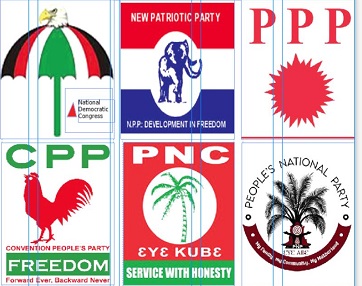
Post-Election Reflections —Focus on Political Parties
Political parties are a central part of Ghana’s democratic architecture. With the 2024 presidential and parliamentary elections over, I draw on data from the most recent Afrobarometer (Round 10, 2024) to highlight Ghanaian attitudes towards political parties.
I also make comparisons to previous rounds of the survey and note changes, positive or negative, in those attitudes.
Political Parties
First, Ghanaian attachments to political parties continue to loosen. In 2024, when asked “Do you feel close to any particular political party” 47 per cent answered “Yes.”
This is a significant decline of twenty percentage points compared to 1999 (Round 1) when 67 per cent answered “yes.” The decline cuts across all major demographic groups.
For example, among Ghanaians living in urban areas, the percentage who say they feel close to a political party has dropped from 66 per cent to 44 per cent while among those living in rural areas, it has dropped from 67 per cent to 52 per cent. Among 18–25-year-olds, those who say they feel close to political parties have dropped from 66 per cent to 36 per cent.
Second, Ghanaians continue to strongly reject one-party rule. Those who say they “strongly disapprove/disapprove” of “only one political party being allowed to stand for election and hold office” in 2024 stands at 84 per cent, which is a six-percentage point increase from 1999.
Turnerover
Third, Ghanaians support political party turnover. In 2024, 61 per cent supported the idea that “in a democracy, it is better if power sometimes changes hands in elections from one political party to another” compared to 38 per cent who supported the idea that “in a democracy, as long as a government is elected by the people in a free and fair election, it doesn’t matter if one party always wins and continuously governs the country.”
When the question was first asked in 2022, Ghanaians were split 69 per cent (support for party turnover) to 30 per cent (support for no party turnover).
It is interesting to note the increase in support for no party over.
Fourth, our tolerance for fellow citizens from different political persuasions appears to be changing. In 2024, 12 per cent of Ghanaians say they will “dislike/strongly dislike people who support a different political party as neighbours” compared to 6 per cent when the question was first asked in 2022.
Among partisans, the increase is from 7 per cent (2022) to 11 per cent (2024). Among non-partisans, the increase is from 6 per cent (2022) to 13 per cent (2024).
Fifth, political party officials are still not points of contact for Ghanaians in their civic engagements.
When asked “During the past year, how often have you contacted any of the following persons for help to solve a problem or to give them your views: A political party official?” as many as eight out of ten Ghanaians (80 per cent) answered “never” in 2024.
This is not very different from 2002 (83 per cent) when the question was first asked.
Declining trust
Sixth, there is a declining trust in political parties. In 2024, 12 per cent expressed “a lot” of trust in ruling political parties, significantly down from 35 per cent when the question was first asked in 2002.
What makes this noteworthy is that there was a point in time (2008) when 43 per cent had “a lot” of trust in the ruling party. In addition, trust in the ruling party has declined from 34 per cent (2017) to 12 per cent (2024). The sentiments are no different for opposition political parties.
In 2024, only 11 per cent expressed “a lot” of trust in them, representing a decline from 23 per cent in 2002.
Seventh, Ghanaians want more cooperation with opposition political parties in dealing with the government. In 2024, 64 per cent agreed that “opposition parties should concentrate on cooperating with the government and helping it develop the country” compared to 57 per cent in 2008.
Among those who agree that “after losing an election, opposition parties should monitor and criticise the government to hold it accountable” there has been a drop from 41 per cent (2008) to 35 per cent (2024).
This must not be misconstrued as a lack of desire for accountability by Ghanaians.
Those who agree that “parliament should ensure that the president explains to it regularly how the government spends taxpayers’ money” have increased from 66 per cent in 2008 to 79 per cent in 2024.
Future of Political Parties
Political parties will continue to be important. In 2024, 82 per cent expressed support for choosing leaders through “regular, open, and honest elections.”
Even among those who say, “It does not matter what kind of government is in place”, 67 per cent support elections. Political parties are here to stay and will continue to play a central role in democracy and good governance in Ghana.
However, there are some challenges to be addressed, mainly trust. Political parties must take active steps to rebuild a lot of the lost trust in them. Perhaps, the goal should be to regain the 2008 trust levels or even higher.
The writer is the Project Director, Democracy Project.
